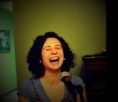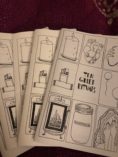
We love sharing stories about how our alumni are using the organizing lessons we taught them to make change in the world. Last month we were fortunate to speak to Chloe Zelkha, an alumna of the 2014 Jewish Organizing Fellowship. One of the many things she said she learned from her experience was the emphasis on storytelling as an organizing tool. “I fell in love with [it],” she said, “and taught it to youth at The Food Project, which is where I was working as a JOIN fellow.”
Today, Chloe is chaplain resident at UCSF Medical Center, where she uses storytelling while sitting at the bedside of someone who is dying. It helps her solicit a review of the person’s life and connect them to their own wisdom and what matters most to them, she explained.
In addition to this work, Chloe has been preparing for the Young Adult Grief Retreat, a project inspired by her own experience, and — by extension — a form of organizing. She was thrilled to tell us more about how the retreat came to be, and what participants can gain from the experience.
JOIN: What inspired you to bring to life a grief retreat?
Two years ago in January, my dad died suddenly of a heart attack – totally healthy person in his 60s. I really was thrown into these questions. And I should also say, relatedly, my partner of many years, now my husband, three months before my dad’s sudden death, was hit by a car on his bicycle on the 2nd day of Rosh Hashanah and suffered really serious injuries, a massive brain injury, he broke his sternum and his neck and had nerve damage on his legs that made him really not able to walk, really serious. So for a year, we were working towards his recovery. Those two moments of powerful grief thrust me into this landscape of big questions about life and death and meaning. … I was woken up to this essential fact that anyone can die at any moment. The central fact of our mortality, and of impermanence. I was like “How do I stay awake to this? I don’t want to go back to sleep and just ignore that that’s true, because I think that there’s some wisdom and power there. How do I stay awake to that without living afraid all the time?”
JOIN: What was your process for finding the answers to such big questions?
The thing that I knew from organizing was that big questions and projects of the heart are best done in community. So, I went looking for people who got it. I came across a few really wonderful organizations, one being The Dinner Party which is a wonderful organization of folks, mostly in their 20s and 30s, who have experienced significant loss, gathering together around dinner tables in all these different cities. I connected with that crew, and also with faith-based communities: the Jewish Healing Center in the Bay area, and with my family at Urban Adamah (this Jewish farm in the Bay area). That’s ultimately what also brought me into chaplaincy. I thought about my professional work thus far, and continue to, as trying to facilitate transformative experiences for people. That’s how I think about what I do. I had known the power of retreat, from my work running this three-month, super-immersive experience with Urban Adamah, the Urban Adamah Fellowship, and with my work running summer-long immersion experiences for diverse youth at the Food Project, and also from sitting retreats myself. I thought it would be so beautiful to combine that form of immersion experiences on an urban farm, that I knew really well, with the population that is now where my heart is. I also thought it would be amazing to do that, instead of in a highly pathologized, clinical way that most grief spaces run, to do that for and by young people who know loss. So I got this idea in my head to do a grief retreat for young people on an urban farm, and Urban Adamah was game to try it out with me. I’m really excited about it; I think it’s going to be really magical and transformative.

Urban Adamah Farm
JOIN: What can participants expect to gain from this experience?
One thing that’s really unique about the retreat is that all facilitators are also participants, and all participants are gonna be asked to hold space for each other. So there’s some things that are really separating us from this really formal therapeutic traditional grief-group vibe, that for me are really important and draw me into spaces. With the exception of a few teachers that we’re bringing in for an hour-and-a-half-long workshop session, who are just coming in and out. Participants can expect to engage with community ritual and with multi-model ways of getting at grief from working with emotions in the body, and with singing, and moving, and making art, and cooking, and also lots of free space and social time to connect with people who get it, or people kind of “in the club.” We’re really centering relationship, so hopefully people really get a chance to connect with others in the way that they want. And also, invitations into speaking from the heart, into silence, into solitude and also into community.
JOIN: Does a person have to be Jewish to attend?
Nope! The retreat is open to folks of all backgrounds and we hope it will be a diverse crew.
JOIN: What encouragement can you give to someone who is considering participating in the Jewish Organizing Fellowship?
JOIN is such a special opportunity to deepen into yourself as a leader and as a Jewish person and as an organizer, and to deepen into this powerful community that can love you and push you. There’s nothing better than that. That’s basically as good as it gets!
JOIN: Is there a memorable moment from your JOIN experience that you can share with us?
I’m thinking about our closing retreat, and at that point in the program the fellows were empowered to plan and facilitate almost all of the retreat, which was so empowering and special. Dylan [Kaufman-Obstler] and Henry [Neuwirth], two of the fellows in my cohort, led a closing ritual that took us through the story of our year together, in conjunction with the story of each of our lives, and the story of the seasons. It was a very powerful and creative ritual that was home-grown out of our group. When we finished, we all spontaneously gathered in this tight little circle and sang one of our group’s favorite songs to sing. I remember it starting slow and building and building until we were practically jumping up and down wailing, some people laughing raucously, some people shedding tears, and I just found that group ritual to be such a good descriptor of how open our hearts were to learning but also to each other during that year. It was such a sacred moment. I remember that really strongly.
*******
Chloe is also writer and illustrator of how-to zines on crafting rituals to honor loss. Find out more about Ten Grief Rituals here.






